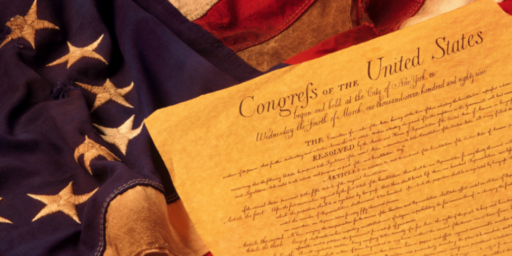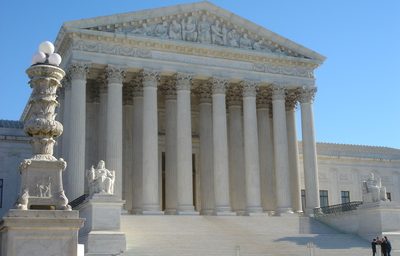Supremes Duck Flag Case
AP — Supreme Court Preserves ‘God’ in Pledge
The Supreme Court preserved the phrase “one nation, under God,” in the Pledge of Allegiance, ruling Monday that a California atheist could not challenge the patriotic oath but sidestepping the broader question of separation of church and state.
At least for now, the decision — which came on Flag Day — leaves untouched the practice in which millions of schoolchildren around the country begin the day by reciting the pledge.
The court said atheist Michael Newdow could not sue to ban the pledge from his daughter’s school and others because he did not have legal authority to speak for her.
Newdow is in a protracted custody fight with the girl’s mother. He does not have sufficient custody of the child to qualify as her legal representative, the court said. Eight justices voted to reverse a lower court ruling in Newdow’s favor.
The headline of the piece is really a misnomer, as the article itself makes clear. The Court dodged the question on the rather dubious–and seldom invoked these days–premise that Mewdow didn’t have a right to sue.
Update: Interestingly, WaPo gets the headline right: Supreme Court Dismisses Pledge Case on Technicality (they use the same AP wire text).





Standing is, in fact, invoked frequently, and the interpretation of the California statutes in this matter are important. It’s not a ‘technicality.’ Newdow didn’t have the right to sue, so he doesn’t get to sue. It’s as simple as that.
Newdow’s standing is based on California state law, and normally the Supreme Court doesn’t overrule the Circuit Courts on such issues. Today’s decision is a big cop out and a waste of judicial resources.
I wrote more about it at my blog.
Alex: I agree. The notion that a non-custodial parent who has no right to control his daughter’s education should be able to sue the school district to enforce the rights he doesn’t have strikes me as daffy. The only surprise there was that it was the liberals (plus Kennedy) making that argument.
Michael: I read your blog entry, but I don’t understand your argument. What on earth does this case in particular, or the standing doctrine in general, have to do with Dred Scott?
James: what does this case have to do with the flag?
Xlrq: It revolved around the Pledge of Allegiance, to the Flag, of the United States of America [etc.].